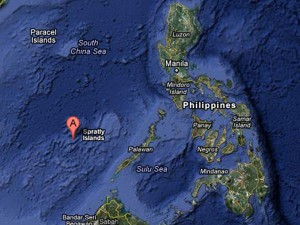MANILA, Philippines—Concerned about the escalating tensions in the West Philippine Sea (South China Sea), a group of experts on diplomacy and maritime disputes settlement has called on the Aquino administration to establish a more strategic and lasting policy on handling the territorial tug-of-war in the contested waters, citing the region’s importance as an economic resource and defense hub for the Philippines and the region.
The informal group, composed of former government officials and members of the academe, also underscored the need for government to encourage greater public involvement in the debate by fomenting an “archipelagic conscious and identity of the Philippines and the Filipinos as a maritime nation.”
“There is a need for a comprehensive and strategic approach to policymaking on the WPS, taking into consideration the myriad short- to long-term interests of the country at stake, the fluid regional and international environment, and the domestic imperatives that will affect how government prioritizes the allocation of its efforts and resources,” read the white paper released this month.
Led by former Senator Leticia Ramos Shahani, the group’s 11-page paper was submitted to the Office of the President, the Department of Foreign Affairs, the Department of National Defense and the National Economic and Development Authority following a series of meetings held under the auspices of the University of the Philippines’ Asian Center.
Prompted by the “individual and collective desire to assist government,” the group called on the administration to place national interest at the apex of such strategic policy and pushed for the creation of “permanent high level institutions” that would assert the Philippine position on the disputes sans the limits of elective terms.
Such policy, the group said, should assert that the country’s claimed territories in the West Philippine Sea “are part of national patrimony” and would also affirm the Philippines’ commitment to resolving disputes peacefully.
The group further urged government to “develop a comprehensive, long-term program for international legal actions on issues relating to the disputes,” covering procedure such as negotiation of boundaries, arbitration and litigation international courts.
The group, composed of former defense, energy, foreign affairs and natural resources officials and members of the academe, underlined the need for a strong disputes policy amid shifting diplomatic interplay among the countries involved, including China, members of the Association of Southeast Asian Nations (Asean), and the United States, which has trade and defense interests in the Pacific.
China claims most of the Spratlys, countering partial claims of the Philippines, Vietnam, Malaysia, Brunei and Taiwan.
“The West Philippine Sea disputes have had the most impact on our ties with China, the United States and with Southeast Asia. The disputes have led to an undesirable sharp deterioration in our relations with China, an increased need to strengthen defense cooperation with the US, while challenging us to help build a common Asean position,” the white paper read.
While supporting the current policy of pushing for a rules-based and multilateral approach to settle the disputes, the group noted that the Philippines’ “staunchly nationalist and at times seemingly provocative stance against China as well as open calls for US involvement and support, have caused concern among some neighboring states in the Asean.”
The group also cited “little informed policy debate” among Filipinos and lacking coverage of maritime issues in popular media, hence the need to develop “a critical mass of experts and enthusiasts” and to tap mass and social media, the academe and state information agencies to more widely disseminate information about maritime disputes.
Such comprehensive policy is critical as the West Philippine Sea holds marine, oil and mineral resources that would be critical for the sustenance of future Filipino generations, according to the group.
“Philippine policies on oil and gas cooperation or joint development in the West Philippine Sea need to be clarified. The key obstacles to joint development are security concerns and commercial reservations about partnering with oil companies from rival claimant states, as well as fear of potential impacts on the country’s legal position,” the group said.
The group urged government to create a strategic development program for these resources within the country’s Exclusive Economic Zone in the disputed waters, including plans for sustainable fisheries, oil, gas and mineral resources exploration coupled with the necessary law enforcement requirements to protect this sovereign exercise.
Government must also enhance the country’s defense capabilities in the western seaboard, citing a “regional defense buildup” that might “spark an arms race that will clearly not be in the Philippines’ national interest,” the paper said.
“In view of the limited capabilities of both our military and civilian law enforcement agencies, and the need to allocate resources for their upgrading, their respective roles and mandates will need to be clarified,” it said.
